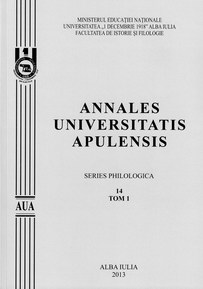The Religious Discourse as a Means of Coping with History: the Case of Romanian 1830s-1860s
The Religious Discourse as a Means of Coping with History: the Case of Romanian 1830s-1860s
Author(s): Crina PoenariuSubject(s): Cultural Essay, Political Essay, Societal Essay
Published by: Universitatea »1 Decembrie 1918« Alba Iulia
Keywords: Romanian Romanticism; religious discourse; nationality; idioculture; literary journal
Summary/Abstract: The man that has religious knowledge gives himself an opportunity to expand his Weltanschauung. Furthermore, when internalized, this knowledge becomes increasingly vivid in the field of literature. It may apply to contemporaries, but it could also be applied to former modern writers. This paper intends to highlight several implications that the religious knowledge had in the Romanian Romantic movement, from 1830s to 1860s. One of the premises of this approach would be that a text's history, meaning its reception, circulation and sense rely on a ‘support’, which Derrida referred to as ‘historicity’ – what the text has meant or would meant and which are its intentions. It's what Colebrook would understand by reading it: that we presuppose an originating intention and that there is a sense to be revealed. Specifically, this paper attempts to tackle some of the main issues concerning the way the religious discourse permeated the literary discourse, what kind of discourse is it, which are the major topics chosen and, furthermore, which are the implications with the prophetic and apocalyptic imageries.
Journal: Annales Universitatis Apulensis. Series Philologica
- Issue Year: 14/2013
- Issue No: 3
- Page Range: 323-332
- Page Count: 10
- Language: English

